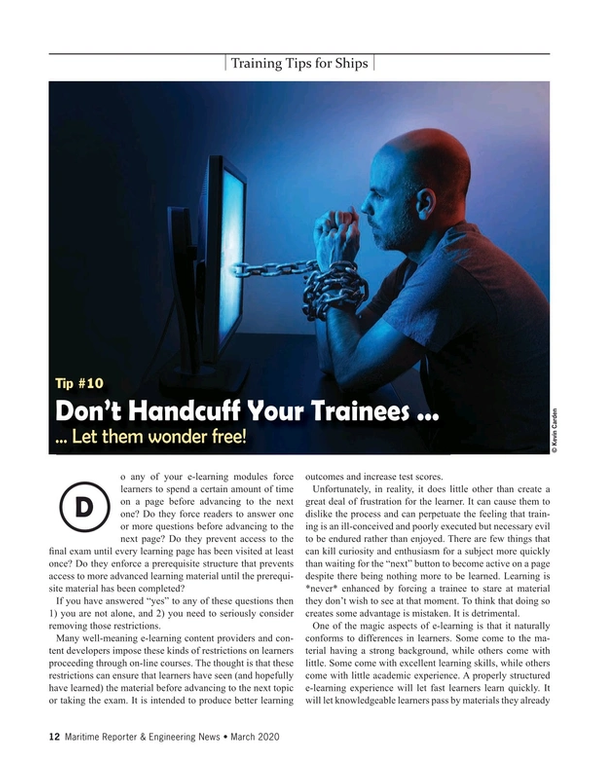
Training Tips for Ships: Tip #10 - Don’t Handcuff Your Trainees
Do any of your e-learning modules force learners to spend a certain amount of time on a page before advancing to the next one? Do they force readers to answer one or more questions before advancing to the next page? Do they prevent access to the final exam until every learning page has been visited at least once? Do they enforce a prerequisite structure that prevents access to more advanced learning material until the prerequisite material has been completed?
If you have answered “yes” to any of these questions then 1) you are not alone, and 2) you need to seriously consider removing those restrictions.
Many well-meaning e-learning content providers and content developers impose these kinds of restrictions on learners proceeding through on-line courses. The thought is that these restrictions can ensure that learners have seen (and hopefully have learned) the material before advancing to the next topic or taking the exam. It is intended to produce better learning outcomes and increase test scores.
Unfortunately, in reality, it does little other than create a great deal of frustration for the learner. It can cause them to dislike the process and can perpetuate the feeling that training is an ill-conceived and poorly executed but necessary evil to be endured rather than enjoyed. There are few things that can kill curiosity and enthusiasm for a subject more quickly than waiting for the “next” button to become active on a page despite there being nothing more to be learned. Learning is *never* enhanced by forcing a trainee to stare at material they don’t wish to see at that moment. To think that doing so creates some advantage is mistaken. It is detrimental.
One of the magic aspects of e-learning is that it naturally conforms to differences in learners. Some come to the material having a strong background, while others come with little. Some come with excellent learning skills, while others come with little academic experience. A properly structured e-learning experience will let fast learners learn quickly. It will let knowledgeable learners pass by materials they already know. Furthermore, it will enable the curious to skip ahead, and go back to review. It will allow the learning experience conform to the learner. Enthusiasm for learning needs to be inspired and supported, not frustrated.
The basic solution is therefore obvious. Remove all navigation restrictions from your e-learning pages. Let learners advance through the pages without regard to timing and without the need to first answer related questions. Even let them skip straight to the exam if they wish to do so. Do not handcuff your trainees but instead let them explore the material and assessments in the order and at the pace that makes most sense for them and that supports their curiosity.
There is no rationale nor is there any research that supports adding these navigational restrictions. Regardless, there are concerns that are often raised: If we let the learner skip over a page of content, then how can we be sure they learned it? If we let them advance to new material before learning the prerequisites, it will confuse them. If we allow them to attempt the final exam before having spent sufficient time on the learning materials, how can we be sure they are prepared? And finally, if regulatory requirements insist that a course be a particular number of hours, how else do we meet this requirement in an e-learning context?
We can address all these issues, and we will do so in next month’s Training Tips for Ships!
Until then, sail safely!
MarTID 2020: Deadline Extended
The 2020 MarTID survey of mariner training practices is extended to March 31, 2020, and your participation is vital to its success. For a full background on the initiative, visit: http://scholar.wmu.se/martid
• VESSEL OPERATORS
https://www.surveymonkey.com/r/2020MarTIDOperator
• TRAINING INSTITUTIONS
https://www.surveymonkey.com/r/2020MarTIDMETI
• SEAFARERS
https://www.surveymonkey.com/r/2020MarTIDSeafarer
Read Training Tips for Ships: Tip #10 - Don’t Handcuff Your Trainees in Pdf, Flash or Html5 edition of March 2020 Maritime Reporter
Other stories from March 2020 issue
Content
- Training Tips for Ships: Tip #10 - Don’t Handcuff Your Trainees page: 12
- NOAA-Viking Public Private Partnership, a Win-win for Research page: 14
- Maritime's 'Path to Zero': The Case for Ferries page: 16
- The Maritime Industry and COVID-19 page: 18
- Dredging: Managing the Impact of Channel Deepening and Widening on Surrounding Structures page: 24
- Staten Island Ferries: A "New York State of Mind" page: 30
- Eye on Maritime Design: Better Ferries by (EBDG) Design page: 38
- Marine Tech: Marine Evacuation Systems from Survitec page: 56
- 24/7 Voyage Security Risk Assessment … at the click of a mouse page: 62
- Opinion: Maritime Freedom & the Global Commons page: 72


